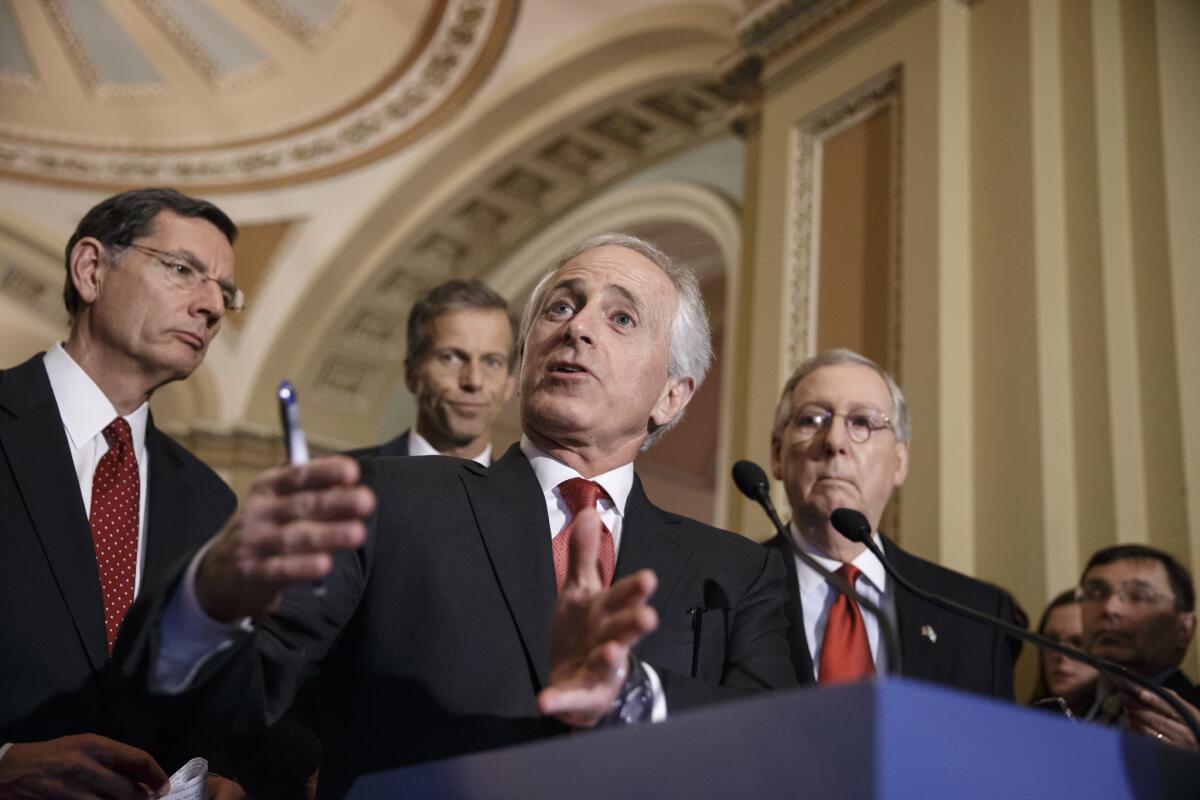Column: Obama’s hurdles to shielding any Iran deal from Congress’ tinkering

Senate Foreign Relations Committee Chairman Bob Corker (R-Tenn.) outlines his bill requiring congressional review of any comprehensive nuclear agreement with Iran.
President Obama faces two serious problems as he tries to protect his still-unfinished nuclear agreement with Iran from congressional tinkering — or destruction. One is the ferocious opposition of Republican hawks who view the deal as insufficiently tough on Tehran. The other is nervousness among Democrats who view the deal as promising but politically risky.
First, the GOP. Not a single prominent Republican has spoken up in favor of the deal. Among likely presidential candidates, almost all have denounced it. Former Florida Gov. Jeb Bush, the most moderate, said: “I cannot stand behind such a flawed agreement.” Others were harsher; Sen. Marco Rubio (R-Fla.) called Obama’s diplomatic efforts “farcical.” The only exception was Sen. Rand Paul (R-Ky.), who a few months ago said he supported negotiations with Iran but now says, carefully, that he’s studying the matter.
Foreign policy hasn’t always been this partisan — not even under Obama, whom many conservatives consider the Great Polarizer. In the president’s first year, Sen. John McCain (R-Ariz.) praised him for escalating the war against Al Qaeda and slowing troop withdrawals from Afghanistan. In 2010, Obama won the votes of about one-third of the Senate’s Republicans for a nuclear arms treaty with Russia. And in 2011, Obama approved the raid that killed Al Qaeda leader Osama bin Laden, which was a bipartisan crowd-pleaser even if some Republicans felt the president took too much credit.
But events — and politics — conspired against that modest degree of comity. In Obama’s second term, his foreign policy suffered one reversal after another: a bloody stalemate in Syria, a Russian invasion of Ukraine, the rise of Islamic State in Iraq. The public’s confidence in his foreign policy fell to 31% in one poll (from a post-Bin-Laden high of 53%). In the 2014 congressional election, Republicans found that military strength, one of their traditional selling points, was attracting voters’ attention again.
As a result, as Obama works to shepherd the nuclear agreement past a Congress with solid Republican majorities in both houses, he’s already — in effect — playing for a tie. White House officials acknowledge that it would be virtually impossible to win an affirmative vote to approve the kind of deal that negotiators outlined last week. Instead, they’re simply hoping to prevent Congress from holding up the implementation of a final agreement, should one materialize.
In this unpromising landscape, the closest thing to a champion of bipartisanship is the Republican chairman of the Senate Foreign Relations Committee, Sen. Bob Corker (R-Tenn.). He has kept his rhetoric moderate and has cagily focused on a single point of possible consensus among Republicans and Democrats on his committee: When a deal is produced, they’d like a say in whether it goes into effect.
Corker has written a bill that sounds reasonable. It would give Congress 60 days to look at any agreement with Iran. During that period, the administration would be prohibited from waiving economic sanctions that are now in place. If Congress voted against the deal, the deal would die; if Congress approved the deal or didn’t vote, the deal would live.
That simple procedural goal has enabled Corker to win the endorsements of 11 Democratic senators plus one independent, one short of the 13 he would need (added to all 54 Republicans) for a veto-proof majority of 67. His bill’s cosponsors include Sen. Charles E. Schumer (D-N.Y.), the next Senate Democratic leader, and Sen. Tim Kaine (D-Va.), a former chairman of the Democratic National Committee.
Why are Democrats lining up with the Corker bill? Most say it’s merely a matter of preserving congressional prerogative. “I strongly believe Congress should have the right to disapprove any agreement,” Schumer said Monday.
But aides acknowledge that there’s also a fear, especially for senators facing tough reelection campaigns, of looking insufficiently skeptical about the deal. There’s a measure of squeamishness about sticking too closely to a lame duck president whose popularity is below 50%. And one effect of polarization is that it’s hard on moderates who’d prefer to find a position somewhere between hell yes and hell no; for some, Corker’s bill provides, at least temporarily, that centrist option.
That doesn’t mean Obama and his aides are comfortable with it. White House aides have said they worry the Corker bill would complicate the next stage of negotiations by signaling that Congress might block a final agreement. And they say they don’t like the precedent of Congress passing legislation on a diplomatic agreement before it’s even been concluded.
But none of those objections appears to have moved any Democrats away from supporting the Corker bill. Obama hasn’t made the sale — not even in his own party.
The White House hopes to weaken the bill with amendments; but it looks increasingly as if the Senate will pass something requiring formal review of any final deal. The president will warn that the bill endangers the agreement, but he will still send his negotiators back to work. And Congress will prepare for an epic foreign policy debate — at a moment of almost unprecedented polarization.
Twitter: @DoyleMcManus
Follow the Opinion section on Twitter @latimesopinion and Facebook
More to Read
A cure for the common opinion
Get thought-provoking perspectives with our weekly newsletter.
You may occasionally receive promotional content from the Los Angeles Times.







